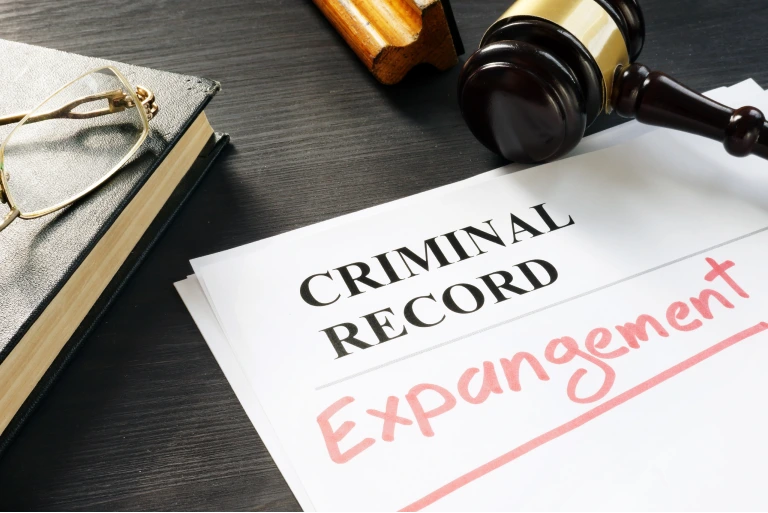
Are you struggling with the consequences of a criminal record? You’re not alone. A criminal record can be a significant obstacle, affecting your opportunities in employment, housing, and other areas of life. At Ernest Acevedo Law Group in San Antonio, TX, we understand the importance of clearing your record and offer experienced legal assistance in expungements. Contact us at 201-226-5656 for a comprehensive consultation on how we can help you achieve a fresh start.
With a wealth of experience in criminal defense, our attorney at Ernest Acevedo Law Group are dedicated to helping residents of San Antonio navigate the complexities of the expungement process. We recognize that everyone deserves a second chance, and our goal is to provide effective legal strategies to dismiss past convictions from your record, allowing you to move forward without the burden of past mistakes.
Contact our law firm at (210) 226-5656 for a free consultation and discover how our San Antonio expungement attorney can assist you in exploring your options for expungement. Let us help you turn over a new leaf with a clear record.
How Ernest Acevedo Law Group Can Help With an Expungement in San Antonio

Having the correct legal assistance, during the challenging process of expungement becomes less daunting. Retaining a San Antonio Expungement lawyer, at Ernest Acevedo Law Group, offers comprehensive services to help clients clear their criminal records.
The experienced team at Ernest Acevedo Law Group efficiently guides clients and their families through every step of the expungement process, from assessing eligibility to courtroom representation.
Ensuring Eligibility:
Determining your eligibility for expungement is the first step in the process, and it can be confusing. By gaining the help of a San Antonio expungement attorney, at Ernest Acevedo Law Group, you can assess your eligibility based on the specific laws and regulations in your jurisdiction.
We assist in ensuring all necessary criteria are met before investing time and resources into the application process. This includes completing probation or sentence, paying off fines and court costs, and having no other criminal convictions.
Filling Out the Right Paperwork:
Properly completing and filing the required paperwork for expungement is crucial to a successful outcome. Our team at Ernest Acevedo Law Group assists in gathering essential documents like fingerprints, criminal records, and completed forms. Our expertise in Texas expunction law ensures that your application is accurately prepared and submitted, increasing the likelihood of a favorable decision.
Handle Court Filings:
Court filings for expungement can be a complex and time-consuming process. Ernest Acevedo Law Group’s expert attorney handles these filings for our clients, ensuring that all legal requirements are met and that your case is presented in the best possible light to law enforcement officials.
Entrusting your expungement case to a knowledgeable attorney allows you to focus on moving forward with your life, leaving the legal details in our capable hands.
Expertise at Hearings:
Should your expungement case require a hearing, our law firm provides experienced representation to present your case effectively to the court. Our criminal defense attorney has a deep understanding of Texas expunction law and can skillfully argue on your behalf, increasing the likelihood of a successful outcome.
Overview of Expungements in Texas

Expungement in Texas offers a legal avenue for individuals with certain types of criminal records to have their records cleared or sealed, effectively removing them from public view. This process can open doors to new opportunities by removing barriers to employment, housing, and other aspects of daily life. Understanding the types of convictions eligible for expungement and the specific requirements is key.
Texas law allows for the expungement of:
- Arrests that did not result in a guilty conviction or probation (except for Class C misdemeanors)
- Certain Class C misdemeanor offenses such as public intoxication, disorderly conduct, and simple assault
- Individuals who have been acquitted, pardoned, or found factually innocent following a conviction
While expungement offers significant benefits, keep in mind that not all criminal records qualify for this process. Certain convictions, such as sex crimes involving minors and violent felonies, cannot be expunged in Texas. Additionally, the process of expungement does not completely erase a criminal record, as specific law enforcement agencies and the criminal justice system may still access the information in certain legal proceedings.
What Are The Criteria for Expungement?
Expungement eligibility in Texas is dependent on the type of offense and the successful completion of probation or other court-ordered punishments. Individuals who have been given deferred adjudication judgments at Class B misdemeanor or higher, or any type of felony offense, are prohibited from obtaining expungement of their records. This means their criminal record cannot be wiped away..
To be considered for expungement, individuals must have fulfilled all the terms of their sentence, including probation, fines, and community service. Additionally, they must not have any other pending criminal charges or convictions.
A clear understanding of these eligibility requirements aids in successfully navigating the expungement process.
Convictions That Cannot Be Expunged
In Texas, certain criminal convictions cannot be expunged, regardless of the circumstances. These include:
- Child molestation
- Fleeing the scene of an accident
- Serious DUIs resulting in death
- Other heinous crimes
The upcoming subsections highlight specific crimes involving minors that disqualify an individual from expungement.
Sodomy with a child:
Sodomy with a child is a grave offense involving any sexual act between an adult and a minor under the age of consent. It is considered a form of child sexual abuse and carries severe legal penalties, including prison time and registration as a sex offender.
Due to the serious nature of this crime, individuals convicted of sodomy with a child are ineligible for expungement in Texas.
Lewd acts with a child:
Lewd acts with a child involve any form of sexual contact or touching of a child with the intent of sexual gratification. Like sodomy with a child, this offense is considered a serious crime and carries felony charges.
Those convicted of lewd acts with a child are not eligible for expungement in Texas.
Oral Copulation with A Child:
Oral copulation with a child is another severe criminal offense that involves any contact between the mouth of one person and the sexual organs or anus of a person under the age of consent. This crime carries significant legal penalties, including imprisonment and registration as a sex offender.
Individuals convicted of oral copulation with a child are ineligible for expungement in Texas.
Statutory Rape:
Statutory rape occurs when an individual engages in sexual activity with a minor who is below the legal age of consent. Even if the minor consents to the activity, it is still classified as rape, and the perpetrator can face severe legal penalties.
Due to the nature of this crime, individuals convicted of statutory rape are not eligible for expungement in Texas.
Eligibility for Expunction
As mentioned earlier, eligibility for expunction in Texas is dependent on the type of offense and the successful completion of probation or other court-ordered punishments. Deferred adjudication judgments for Class B misdemeanor offenses or any felony can’t be expunged. Such records are ineligible for expungement..
However, individuals who have fulfilled all the terms of their sentence, including probation, fines, and community service, and who do not have any other pending criminal charges or convictions, may be eligible for expunction. Grasping these requirements enables individuals to navigate the expungement process more effectively, thereby increasing their chances of clearing their criminal records.
Benefits of Expungement
There are numerous benefits to criminal record expungement, including improved job opportunities, better housing options, and reduced stigma associated with a criminal record.
The subsequent subsections delve into a detailed exploration of these benefits.
Ease in Job Hunting:
Having a criminal record expunged can significantly improve your job prospects. Many employers conduct background checks, and a criminal record can be a major obstacle in securing employment.
With an expunged arrest record, you can legally deny that you were arrested when asked on employment applications, which can lead to more job opportunities and increased career success.
Improved Housing Opportunities:
Expungement can also lead to better housing options, as many landlords conduct background checks and may be hesitant to rent to someone with a criminal record. With an expunged record, you can confidently apply for housing without the fear of being denied based on your criminal history.
Reducing Stigma:
Lastly, expungement can help reduce the stigma associated with having a criminal record. Many people with criminal records face discrimination and social isolation due to their past mistakes. By having their records expunged, individuals can begin to rebuild their lives and reintegrate into society without the constant reminder of their criminal past.
What Happens at an Expungement Hearing in San Antonio, Texas?
In San Antonio, Texas, expungement hearings are an essential part of the process. During these hearings, the court will evaluate the expungement request and determine whether to grant or deny it. The respondent, or the person whose record is being considered for expungement, has the opportunity to attend the hearing and contest the expunction.
If you choose to work with Ernest Acevedo Law Group, our experienced attorney will present evidence supporting your expungement at the hearing. This may include proof of probation completion, employment history, and any other relevant information that demonstrates your rehabilitation and compliance with the law. our expertise and support ensure your expungement case is presented most effectively.
The Court Sets a Hearing Date
Once your expungement petition has been filed, the court will set a hearing date. This date is typically scheduled within a specified period, such as 30 days following receipt of the answer, or within 90 days of the hearing.
The court will inform all relevant parties about the hearing date, providing sufficient time for both the petitioner and respondent to prepare their cases.
Your Attorney Will Present Evidence
At the expungement hearing, Ernest Acevedo Law Group will present evidence to support your request for expungement. This may include documentation, witness testimony, and any other pertinent evidence that demonstrates why your record should be expunged.
Entrusting your case to a skilled attorney allows you to concentrate on rebuilding your life, while they manage the legal intricacies of your expungement case.
Completion of probation without any violations:
One key piece of evidence that can be presented at an expungement hearing is the successful completion of probation without any violations. This demonstrates to the court that you have fulfilled your legal obligations and are now abiding by the law.
By providing proof of your successful probation completion, your attorney can effectively argue for the expungement of your record.
Maintaining employment:
Another important piece of evidence is your employment history. Maintaining steady employment during and after your probation period can show the court that you are a responsible and law-abiding citizen who has reintegrated into society. This evidence can help support your request for expungement and increase the likelihood of a successful outcome.
Accepting punishment:
Finally, accepting the punishment associated with your conviction can also serve as evidence in your expungement hearing. This demonstrates to the court that you have taken responsibility for your actions and have learned from your past mistakes.
By presenting this evidence, your attorney can make a compelling case for why your record should be expunged.
What Can I Do If My Expungement Is Denied?
If your expungement request is denied, don’t lose hope. There are still options available to you.
The following subsections explore various alternatives including re-filing, appealing the decision, obtaining a certificate of rehabilitation, and seeking a governor’s pardon.
File Again
One option is to re-file for expungement. You may be able to submit a new application at a later date if there have been significant changes or circumstances that warrant a new evaluation of your case.
Consult with a knowledgeable San Antonio expungement attorney to discuss your options and the best course of action for your situation.
Appeal the Expungement Decision
Another option is to appeal the expungement decision. This involves filing a notice of appeal with the court, submitting a brief to the court, and attending a hearing. During the appeal process, you can present your arguments to a different set of judges in a higher court.
A skilled criminal defense attorney can help you navigate the appeals process and increase your chances of success.
Certificate of Rehabilitation
A certificate of rehabilitation is another option for those whose expungement requests have been denied or who are seeking record sealing. This court order declares that an individual convicted of a crime has demonstrated rehabilitation and is now abiding by the law.
Obtaining a certificate of rehabilitation can enhance your job and housing prospects, even if your record is not expunged.
Governor’s Pardon
Lastly, you may consider seeking a governor’s pardon. This form of clemency is granted by the governor of a state and can provide an opportunity to have your criminal record cleared or reduced.
While obtaining a governor’s pardon is not a guarantee, it is an option worth exploring with the help of a knowledgeable attorney.
Schedule a Free Case Evaluation With Our San Antonio Expungement Lawyer
Should you be considering expungement in San Antonio, contact Ernest Acevedo Law Group for a complimentary case evaluation. Call our San Antonio office at (210) 226-5656. Our experienced attorney can:
- Assess your eligibility
- Guide you through the process
- Represent you in court
- Maximize your chances of a successful outcome.
Don’t let your past hold you back – take the first step toward a brighter future by scheduling a free consultation today.11111

